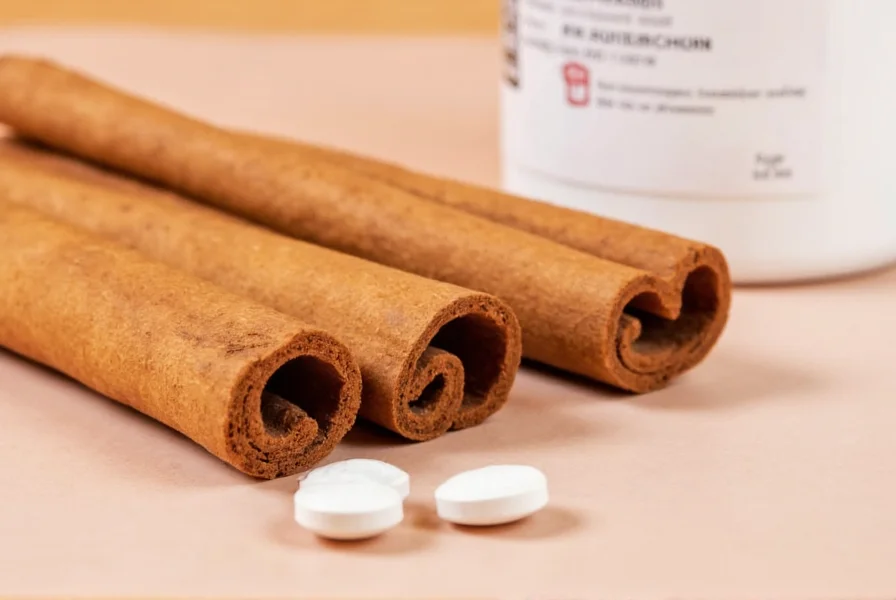When examining whether is cinnamon bad for acid reflux, we must consider both scientific evidence and individual physiological responses. Acid reflux, or gastroesophageal reflux disease (GERD), occurs when stomach acid flows back into the esophagus, causing uncomfortable symptoms like heartburn and regurgitation. Understanding how common spices like cinnamon interact with this condition requires examining multiple factors including chemical composition, digestive effects, and clinical observations.
The Science Behind Cinnamon and Digestive Health
Cinnamon contains cinnamaldehyde, the compound responsible for its distinctive flavor and aroma, which has demonstrated anti-inflammatory and antioxidant properties in scientific studies. However, this same compound can potentially affect digestive processes in ways relevant to acid reflux sufferers. Research published in the Journal of Agricultural and Food Chemistry indicates that cinnamaldehyde may relax smooth muscle tissue, including the lower esophageal sphincter (LES) that normally prevents stomach acid from backing up into the esophagus.
When considering is cinnamon a trigger for acid reflux, it's important to distinguish between different forms of cinnamon consumption:
| Cinnamon Form | Potential GERD Impact | Recommended Approach |
|---|---|---|
| Ground cinnamon (small amounts) | Generally well-tolerated | Start with 1/4 tsp in food |
| Cinnamon supplements | Higher risk due to concentrated dose | Consult physician before use |
| Cinnamon tea | Moderate risk (warm liquid + compound) | Avoid before bedtime |
| Cinnamon in coffee/baked goods | Variable (combined with other triggers) | Monitor individual response |
Individual Variability in Cinnamon Sensitivity
One of the most important considerations when evaluating can cinnamon cause heartburn is recognizing individual differences in digestive responses. While clinical studies haven't established cinnamon as a universal trigger, many GERD patients report personal sensitivity. This variation occurs because:
- Genetic differences affect how individuals metabolize compounds like cinnamaldehyde
- Existing inflammation in the digestive tract can heighten sensitivity to irritants
- Combined effects with other dietary triggers may create synergistic reactions
- Consumption method (on empty stomach vs. with food) significantly impacts tolerance
A 2022 review in the American Journal of Gastroenterology noted that while cinnamon isn't among the top documented triggers like coffee, alcohol, or fatty foods, approximately 15-20% of GERD patients in observational studies reported worsening symptoms after consuming cinnamon-containing products.

Practical Guidance for GERD Patients
If you're wondering is cinnamon safe for people with acid reflux, consider implementing these evidence-based strategies:
- Conduct a personal elimination trial: Remove cinnamon from your diet completely for 2-3 weeks, then reintroduce in small amounts while monitoring symptoms
- Monitor consumption timing: Avoid cinnamon close to bedtime when gravity-assisted digestion is less effective
- Control portion sizes: Limit to 1/4-1/2 teaspoon in food rather than larger amounts
- Choose food combinations wisely: Consume cinnamon with non-trigger foods rather than alongside other potential irritants
- Consider cinnamon type: Ceylon cinnamon ("true" cinnamon) may be better tolerated than Cassia cinnamon due to lower coumarin content
Comparing Cinnamon to Common Acid Reflux Triggers
When assessing cinnamon and GERD relationship, it's helpful to understand where it falls on the spectrum of dietary triggers. Unlike well-established triggers such as:
- Caffeine (relaxes LES in 80% of sensitive individuals)
- Fatty foods (delays gastric emptying)
- Tomato-based products (high acidity)
- Chocolate (contains methylxanthines that relax LES)
Cinnamon appears to have a more moderate and variable effect. A comparative study in Digestive Diseases and Sciences ranked common dietary triggers by symptom exacerbation frequency, placing cinnamon significantly lower than major triggers but above neutral items like most vegetables.
When Cinnamon Might Offer Benefits
Interestingly, some research suggests cinnamon might actually help certain digestive issues. Studies indicate its anti-inflammatory properties could potentially benefit gut health when consumed in moderation. A 2021 pilot study in Nutrition Research found that small amounts of cinnamon (1/4 teaspoon daily) improved gastric emptying in participants with functional dyspepsia, though this doesn't directly translate to GERD benefits.
For those exploring cinnamon tea for acid reflux, it's crucial to note that warm beverages can sometimes soothe digestion, but the cinnamon component may counteract this benefit for sensitive individuals. If trying cinnamon tea, use minimal cinnamon (1 small stick per cup) and consume with food rather than on an empty stomach.
Professional Recommendations
Gastroenterologists generally advise patients with GERD to maintain a food diary to identify personal triggers rather than eliminating foods unnecessarily. The American College of Gastroenterology's 2023 guidelines state: "While certain foods are commonly associated with GERD symptoms, individual responses vary significantly. Personalized dietary modification based on symptom tracking is preferred over blanket restrictions."
When considering natural remedies for acid reflux and cinnamon, remember that what works for one person may not work for another. Some integrative medicine practitioners suggest cinnamon might be beneficial in very small amounts as part of a balanced approach, but emphasize that it shouldn't replace evidence-based treatments for moderate to severe GERD.
Conclusion: Balancing Evidence and Individual Experience
The question is cinnamon bad for acid reflux doesn't have a universal yes or no answer. Current scientific understanding suggests cinnamon isn't a primary trigger for most GERD patients, but individual sensitivity exists. For the majority of people with acid reflux, moderate cinnamon consumption as part of regular meals is unlikely to cause problems. However, those with severe GERD or known sensitivities to spices should exercise caution and consider eliminating cinnamon temporarily to assess personal tolerance.
As with any dietary consideration for GERD, the most effective approach combines evidence-based general guidelines with careful personal observation. When in doubt about cinnamon consumption guidelines for GERD patients, consulting with a registered dietitian or gastroenterologist can provide personalized recommendations based on your specific health profile and symptom patterns.
Does cinnamon directly cause acid reflux?
Cinnamon doesn't directly cause acid reflux in most people, but it may contribute to symptoms in sensitive individuals. The compound cinnamaldehyde can potentially relax the lower esophageal sphincter and irritate stomach lining, which might trigger symptoms in some GERD patients, though it's not considered a primary trigger like coffee or fatty foods.
How much cinnamon is safe for someone with acid reflux?
Most gastroenterologists suggest limiting cinnamon to 1/4 to 1/2 teaspoon per day when managing acid reflux. Start with very small amounts (1/8 teaspoon) to assess tolerance, preferably consumed with food rather than on an empty stomach. Ceylon cinnamon may be better tolerated than Cassia varieties due to lower coumarin content.
Can cinnamon help with acid reflux symptoms?
While some traditional medicine systems suggest cinnamon may aid digestion, there's limited scientific evidence that it helps with acid reflux specifically. Its anti-inflammatory properties might benefit general gut health in small amounts, but for most GERD patients, cinnamon is more likely to potentially trigger symptoms than provide relief, especially when consumed in larger quantities.
Should I avoid cinnamon tea if I have GERD?
Cinnamon tea may pose a higher risk for GERD symptoms than cinnamon used in cooking because it delivers concentrated compounds in liquid form. If you enjoy cinnamon tea, use minimal cinnamon (one small stick per cup), avoid drinking it close to bedtime, and consume it with food rather than on an empty stomach to reduce potential reflux triggers.
How can I tell if cinnamon triggers my acid reflux?
To determine if cinnamon affects your acid reflux, conduct a 2-3 week elimination period where you avoid all cinnamon-containing products. After this period, reintroduce small amounts (1/8 teaspoon) while keeping a detailed symptom journal. Note any symptoms occurring within 1-3 hours of consumption. Repeat the test multiple times to confirm consistency in your reaction before concluding cinnamon is a personal trigger.











 浙公网安备
33010002000092号
浙公网安备
33010002000092号 浙B2-20120091-4
浙B2-20120091-4